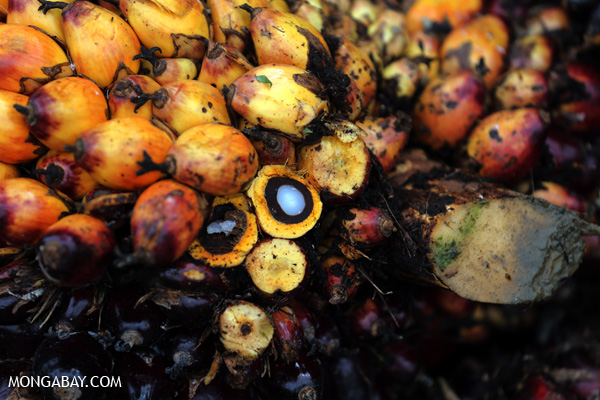
Most palm oil is produced from a species of African palm that is now grown widely across Southeast Asia. The crop’s high productivity makes it the most profitable form of agricultural land use in the tropics.
Agricultural giant Cargill, America’s largest palm oil importer, will no longer buy palm oil from sources associated with deforestation, conversion of peatlands, and social conflict.
The policy, announced Tuesday, follows similar commitments made by other major palm oil buyers, including Unilever and Nestle, and comes after years of direct campaigning led by the Rainforest Action Network (RAN).
Under the terms of the policy, Cargill says it will build “a traceable and transparent palm oil supply chain” that excludes deforestation of high conservation value (HCV) lands and high carbon stock (HCS) areas, conversion of peat, and exploitation of indigenous peoples and local communities.
“We will work to ensure that all palm oil and palm products that Cargill produces, trades or processes are in line with these commitments,” states Cargill, which goes on to note that the commitment is “effective immediately”.
The company added that it may cut off suppliers who don’t comply with its policy.
“Our primary goal will be to work with suppliers in order to seek compliance, and we will develop policies aligned to support improved supplier sustainability,” a Cargill spokesperson told Mongabay.com. “We view this engagement as the best opportunity to make positive changes within the industry. We have removed suppliers in the past for non-compliance and will do so again in the future if necessary.”

Newly established oil palm plantation in Sumatra, Indonesia in February 2014
RAN cautiously welcomed the policy, but warned that it isn’t a strong as the commitments signed recently by industry leaders.
“This announcement marks a milestone in the ongoing international effort to break the links between palm oil production and rainforest destruction, human rights violations and carbon pollution,” said RAN’s Executive Director Lindsey Allen in a statement. “But the lack of adequate deadlines, independent third party verification and an implementation plan to make sure it is actually working, means it remains too early to tell if Cargill will achieve the real change that is so desperately needed.”
Greenpeace, which has also targeted Cargill and is a chief backer of the Palm Oil Innovation Group, an initiative to set stronger environmental criteria for palm oil production, expressed a similar view.
“While the policy is a step in the right direction, it’s not as strong as the commitments made by the Palm Oil Innovation Group and lacks clearer targets for compliance, along with plans for independent verification,” the group said in a press release. “Additional shortcomings include Cargill’s lack of protection for food security and details on if and how this policy will apply to any future plantations Cargill acquires.”

Deforestation for palm oil production in Malaysian Borneo in 2012
However Greenpeace noted that Cargill’s policy includes a “critical” provision to implement an existing carbon accounting protocol used by “greener” producers like Golden-Agri Resources and Wilmar, rather than the still-undefined approach pushed by signees of the Sustainable Palm Oil Manifesto (SPOM).
“While a number of the big palm oil producers that are part of SPOM held off on real actions, Cargill’s policy is explicit in its pledge to implement the existing High Carbon Stock Approach,” said Greenpeace. “This is a critical step to ensure that Cargill’s supply chain will break its links to deforestation, as it adds carbon stocks as one of the criteria that must be considered when planning the use of the land.”

Oil palm fruit in Sumatra. Palm oil, which is widely consumed in the developing world as a cooking oil, is used in a variety of processed foods, cosmetics, and soaps. A small, but growing proportion of the market is used to produce biodiesel.
Over the past two decades, palm oil has become one of the biggest drivers of deforestation in Malaysia and Indonesia. According to a 2013 study, some 3.5 million hectares (8.7 million acres) of forest in Indonesia, Malaysia, and Papua New Guinea was directly converted for oil palm plantations between 1990 and 2010. Palm oil’s role in deforestation has rise sharply since 2006, making it a target for campaigners who are pushing for stronger social and environmental production standards.
Those efforts have led several of the world’s largest palm oil producers, traders, and buyers to establish sourcing criteria that go beyond the standard set by the Roundtable on Sustainable Palm Oil (RSPO), an eco-certification body. Companies currently viewed as market leaders by RAN and Greenpeace include Agropalma, New Britain Palm Oil, Daabon, Golden-Agri Resources and Wilmar, among producers, and Nestlé, Unilever, General Mills, Mondelēz, Kellogg, Safeway, Hershey, Mars, and Proctor & Gamble, among big buyers. The implementation work on several of the early commitments has been led by The Forest Trust (TFT), an international NGO.